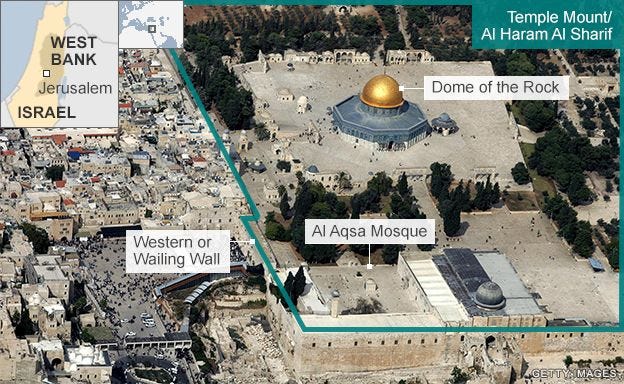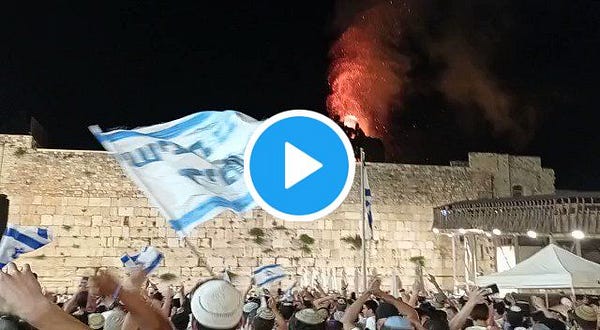🇮🇱🇵🇸 Israel Palestine Violence Explained
The events and context around the worst violence since 2014
Hey folks, today we’re calling an audible from our usual round-up of the latest news around the Middle East. Instead we’ll dissect the ongoing violence in Israel and Palestine.
Explaining a rapidly moving story with literally tens of thousands of years of history and context behind it is really difficult, let alone to fit into a single newsletter. With that said, Daniel and I have done our best to scour through dozens of news reports to decipher the latest and most accurate information.
If you spot an inaccuracy, please reply to this email and we’ll do our best to correct anything we’ve misinterpreted or got wrong altogether.
If you’re after the weekly job board update, check out Monday’s newsletter. And join us tomorrow for a less sombre edition of Picks of the Week. Until then, let’s get to it…
Overview
After weeks of mainly ground skirmishes in East Jerusalem during the holy month of Ramadan, the bubble of tension finally burst this week leading to deadly exchanges from Israel’s military and Hamas militants. Fighting between Jews and Arabs has also erupted in cities across Israel.
So far since the clashes escalated earlier this week, 83 Palestinians and at least six Israelis have died including several Hamas leaders. The fighting between the two foes is the worst since 2014 and has the UN concerned will lead to a “full-scale war”.
No one single event has led to the violence, so we’ll go through some of the main reasons for this latest round of conflict, as excellently detailed by the BBC…
East Jerusalem Evictions
The latest episode of violence has been brewing for years over the possible eviction of eight Palestinian families from their homes by Jewish settlers in the Sheikh Jarrah neighbourhood in East Jerusalem. Nahalat Shimon, a pro-Jewish settler organisation driving the case, is using a 1970 law to argue that Jewish families owned the land prior to 1948. They claim current Palestinian residents should be evicted and their properties handed to Jews.
But there’s little mention that the entire area has swapped hands, both legally and illegally, countless times over tens of thousands of years. Israel’s Supreme Court postponed the Palestinian families’ appeal hearing on Monday, and said a new date would be set within 30 days. Regardless of the final outcome, more violence should be expected.

Ramadan
Then we have the holy month of Ramadan, which sees Muslims fast during daylight hours as an act of worship to feel closer to God. Last month saw Israeli police barricade the plaza outside Damascus Gate, a traditional gathering point for Palestinians following their prayers that leads to the Old City, which didn’t go down well.
According to both Israeli and Palestinian witnesses, it was the Israeli police who stoked the fire that led to bloody clashes between the two sides, including the anti-Arab group Lehava. The police later admitted their decision to erect the barriers was wrong, but was too late as the Israeli military and Hamas exchanged brief retaliatory airstrikes and rockets.
Video: Tensions rise outside Jerusalem’s Damascus Gate
Last Time on Inside The Middle East…
🌍 Inside The Middle East — May 6
🌍 Inside The Middle East — April 29
🌍 Inside The Middle East — April 22
🌍 Inside The Middle East — April 15
Overlapping Calendars
What’s different this year to the past is the overlapping of calendars that most Muslims and Jews in the region follow. Because Muslims adhere to the Hijri calendar, Ramadan begins 10 to 12 days earlier each year, as Al Jazeera excellently outlines in the below graphic. The Hebrew calendar, meanwhile, mostly remains the same each year.
That means Jerusalem Day, which celebrates Israel’s capture of East Jerusalem during the Six Day War in 1967, saw thousands of mostly Israeli nationalists carry out the controversial Flag March through the Old City during Ramadan. The overlapping helped lay the foundations for extended trouble.
Al-Aqsa Mosque Raid
Meanwhile in the al-Aqsa Mosque, hundreds of Muslims gathered to observe the last Friday of Ramadan and to protest the aforementioned delayed eviction hearing. The Mosque is located in the most revered complex for both Muslims and Jews, known as al-Haram al-Sharif or Temple Mount, respectively.

On Friday, Israeli police raided the mosque for no apparent reason, leaving hundreds of Palestinians injured. And on Monday, a tree inside the complex caught fire, whose flames were seen beyond the Western Wall to the glee of thousands of Jews who had gathered to celebrate Jerusalem Day.


Airstrikes and Rhetoric
Lastly, the raid of the al-Aqsa Mosque by Israeli police and the potential evictions were enough for Hamas to launch rockets from Gaza into Israel. Explosions and sirens were heard around Jerusalem and multiple other coastal cities, including the usually-tranquil Tel Aviv.
The Israeli Defence Force responded with several air raids targeting Hamas buildings, but video footage captured a Gazan residential apartment block being destroyed by multiple Israeli airstrikes.
Despite condemning the violence from both Israeli Jews and Israeli Arabs, Prime Minister Benjamin Netanyahu said the government would use all its strength to protect Israel from outside enemies and rioters on the inside.
Meanwhile Hamas leader Ismail Haniya said his group is ready for any future attacks. “If they (Israel) want to escalate, the resistance is ready; and if they want to stop, the resistance is ready,” Haniya said in a televised address late on Tuesday.


That’s all for today. We’ll continue to monitor the situation and have an update next week. Until then, see you tomorrow for Picks of the Week.







